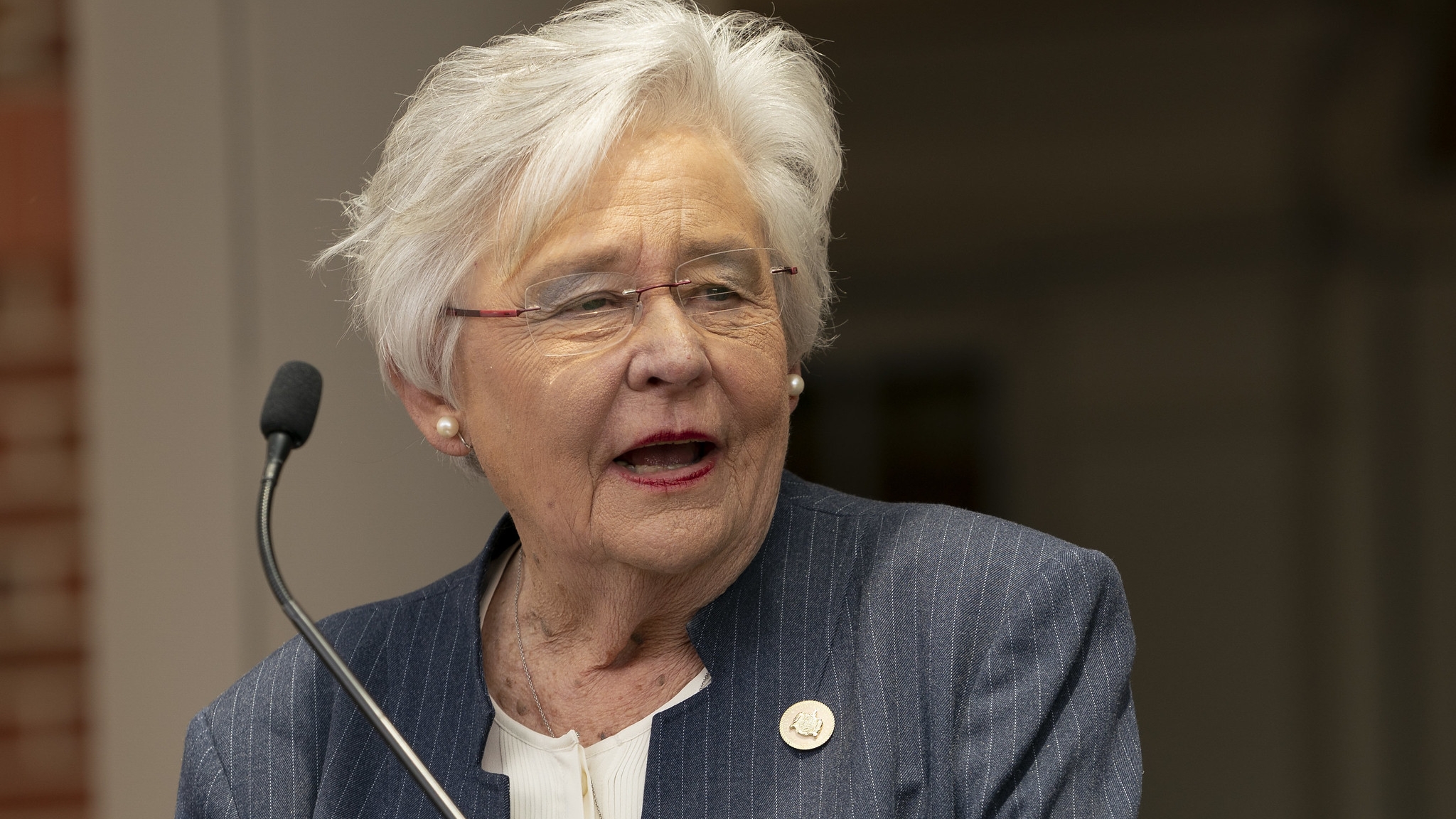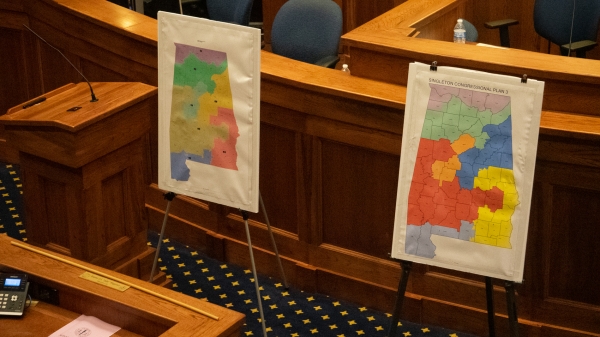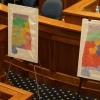Alabama Governor Kay Ivey on Wednesday met with legislative leaders in a special summit to discuss options on how to proceed on improvements to the state’s prison infrastructure.
“We had a very positive, informative meeting this afternoon with Pro Tem Reed, Speaker McCutcheon and the two general fund budget chairmen, Senator Albritton and Representative Clouse, on the status of Alabama’s prisons,” Ivey said.
June 1 had been the deadline to conclude contracts with private prison developers on building three privately owned megaprisons. That deadline came and went without either of the private consortiums being able to find bank financing for the $3.6 billion needed to purchase the land and build the mammoth new penitentiaries.
Ivey had been pursuing the deal to get the new prisons built without having to deal with the Alabama Legislature. Wednesday’s meeting with legislative leaders is a strong indication that the governor’s office plan to “go it alone” has met with setbacks and could be dead in the water.
“No decisions were made today; this was simply an opportunity for an update on where we are and what needs to happen, going forward with respect to improving our prison infrastructure,” Ivey told reporters.
Wednesday’s discussions presumably included discussions about building the new penitentiaries by the state itself, likely financed with a bond issues. Gov. Robert Bentley first proposed paying for four new megaprisons with a bond issue in the 2015 legislative session. That plan by the Alabama Department of Corrections did not have the votes to proceed then. Bentley brought it back to the legislature in 2016 and 2017 where legislators were unwilling to borrow $billions for prison construction. The Ivey administration inherited the bond issue plan in 2017 when Bentley resigned rather than be impeached and Kay Ivey was elevated to the Governor’s Mansion. Ivey and Alabama Department of Corrections Commissioner Jeff Dunn met the same opposition that Bentley had had with the bond issue plan. Following Ivey’s 2019 election, ADOC and the Governor had been pursuing their go it along through a private lease build option so that legislative approval would have been unnecessary.
A bond issue would presumably be approve by the legislature in a special session on prisons this summer. While Republican legislative leaders have voiced their support for a bond issue option if the private lease build plan failed; Democrats have been less than enthusiastic about borrowing $billions to build megaprisons and reportedly none of the Democrats were present at Wednesday’s discussions.
“We agreed there needs to be many conversations held over the coming weeks which would include more legislators and stakeholders,” Ivey acknowledged. “More than anything, though, there was a strong consensus that we must find a solution to this long-neglected challenge that has plagued our state for so long.”
2021 – Senate President Pro Tem Greg Reed (R-Jasper) also released a statement following his meeting with Governor Kay Ivey to discuss issues related to improvements to the Alabama prison system:
“The Governor invited legislative leadership, along with the House and Senate General Fund Budget chairs, to meet with her today to discuss this important topic of prison plans,” Reed said. “We had a good discussion, and the Governor explained to us what happened with her funding and construction plan.”
“The Governor indicated that she wants to work with the legislature on evaluating ways to address and solve this very important topic for our state,” Reed continued. “I look forward to working with the Governor and my colleagues in the Senate and House on a solution that will allow our state to move forward with a plan that is good for Alabama.”
Friday, House Ways and Means Committee Chairman Steve Clouse, R-Ozark, predicted that there would be a special session in mid August to pass a bond issue along the lines of what the legislature was looking at doing in 2016 and 2017.
https://video.aptv.org/video/june-4-2021-ktoadx/?fbclid=IwAR3RPPg-QnKdW0FRHMjtfK7W6iGb7LGswaomOwXhJ7l6cMxCSZP9ruALL-A
“I really thought we would that issue back in 2017; but governor Bentley ran into some issues and had to resign,” Chairman Clouse told PBS’s Don Dailey on Capital Journal ahead of Wednesday’s meeting with the Governor.
“We have had a series of back luck,” Clouse said of efforts to pass a prison bond issue. Clouse cited Bentley’s removal, the 2018 election, a 2017 court ordered redistricting, and the COVID-19 pandemic for thwarting past bond issues for prisons.
“I commend the governor for exploring different options,” Clouse said of Ivey’s effort to do a private lease build. “It seemed to be promising; but the finance issue could not be resolved, and at the end of the day we would not have owned the prisons at the end of the thirty years.”
“I think it is a good idea to start from scratch and go back to the deal that we were looking at five years ago,” Clouse said.
Clouse acknowledged that there would be opposition in the legislature.
“There are people in the legislature that have prisons in their district that know this is the right way to go; but can’t vote for it for political reasons and there are going to be some people who don’t just want to borrow the money,” Clouse said.
“We have got to have new prison. The ones that we have now are dilapidated,” Clouse told Dailey. “We have issues with the federal courts.”
Clouse said that the facilities as they are now makes it a challenge for the Alabama Department of Correction to hire security personnel and mental health professionals, both of which have been ordered by the federal courts.
“It is a daunting task to hire people to work in those facilities as they are now,” Clouse said.
“We need to come up with the exact plan and let everybody see it,” Clouse said. “I think we can get it passed.”
The Governor has said that she will not call a special session unless she is in agreement with the plan.
“She is the only one that can call a special session,” Clouse said. “I believe we will come into agreement.”
“We will have to have a special session to deal with this and along the same lines we have the American Rescue Plan money to appropriate,” Clouse said.
Clouse said that they are still talking with the U.S. Treasury Department to see if they can appropriate some of the American Rescue Act money appropriated to the state for prison construction.
“I think we can use some. I don’t know how much,” Clouse said. “Any amount that we use will help defray some of the expenses from the bond issue.”
Clouse said that he expects two and not just one special session.
“I think we definitely have to have two special sessions,” Clouse said. “The legislative redistricting is always controversial.”
The legislature has to reapportion and redistrict all 105 state house districts, the 35 Senate districts, the seven congressional districts and the state school board districts before the 2022 elections, which are currently scheduled for May 24, 2022.
“There will be controversy when we start moving lines,” Clouse continued. “We may be able to do those three redistrictings in one sessions; but it won’t be a five day session. It will be the full twelve day special session in a thirty day period.”
Clouse predicted that the special session on the prisons will be in mid-August.
“It is an issue that we need to address,” Clouse said.











































